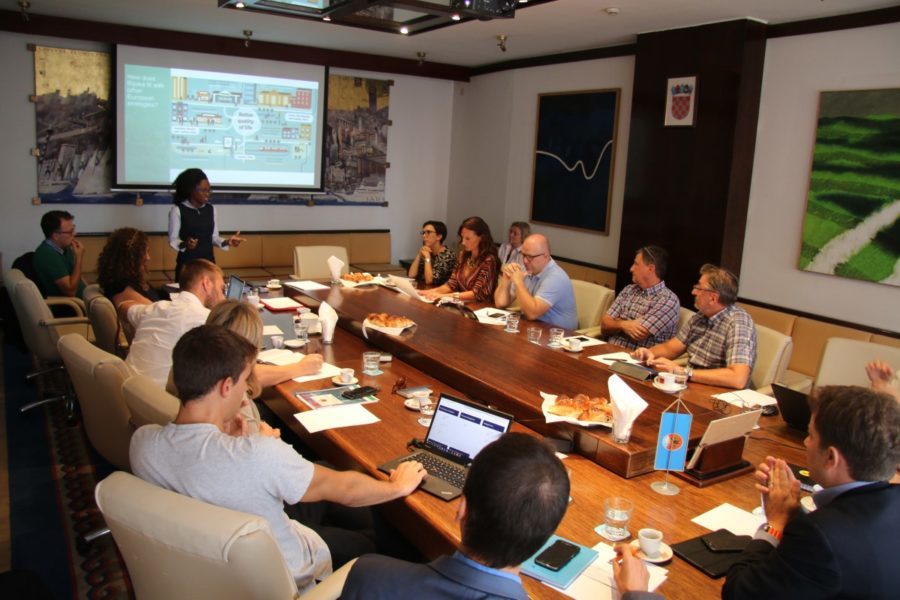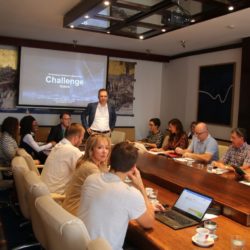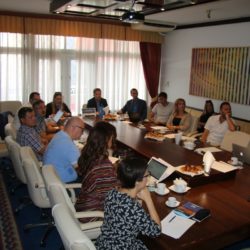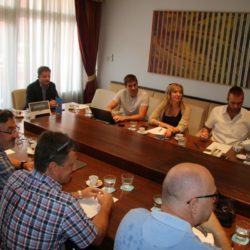
Within the EU project titled “Digital Cities Challenge“ the first thematic workshop titled “Visions and Ambitions” has been held in the premises of the city administration.
The objective of the workshop was to assess the existing situation in Rijeka as regards the extension and availability of digital services for entrepreneurs and citizens and define a general direction towards which the realisation of the DCC project should proceed, with the presentation of examples of implemented digital technology in other European cities.
The working meeting gathered advisers to the European Commission, heads of the City Departments of Culture, Entrepreneurship and Information Technology, entrepreneurs and members of the academic community, in the presence of Marko Filipović, deputy mayor and Andrej Poropat, City Council president.
- The working meeting gathered advisers to the European Commission, City representatives, entrepreneurs and members of the academic community.
- Rijeka digital transformation will be facilitated owing to the diversity of existing e-services, computer data processing power and competence centres put in place.
- Points on which Rijeka should focus are digital public administration, system and data transparency and community development.
In the introductory part of the meeting, European consultants stressed that in order to facilitate higher speed, availability and transparency of digital services, individual approach was needed, tailored to the specific characteristics and functioning context of Rijeka, depending on the assessment of the current situation and methodology for improving the existing and introducing new services. The participants said that Rijeka could make significant progress in creating preconditions for general digitization in city functioning, in particular, in the segment of knowledge dissemination among local population about existing and available services.
During the workshop examples were presented that could provide guidelines to the City of Rijeka, such as the implementation of the system that would enable wide accessibility to big data in Brussels and Slovenia or the system through which utility problems could be notified via a mobile application in Greece.
As positive aspects of Rijeka, which can serve as a project basis, the participants highlighted the diversity of existing e-services, computer data processing power and the existence of competence centres, and the project “European Capital of Culture” was perceived as an opportunity for intensifying city progress.
According to the consultants’ instructions, additional work opportunities open up in the segment of ICT infrastructure development, encouraging the development of commercial skills and knowledge that will go hand in hand with global economic trends and create conditions for commercially viable industry, based on emerging technologies.
In the discussion that needed to determine the vision and ambition of a further course of action in order to improve digital services, several different prospects were presented, based on the location of the ICT sector as an important industry of the economy. As central points, on which Rijeka should focus during project implementation, the participants emphasised digital public administration, system transparency and data and community development. They mentioned a successful operation of the city administration that for eight years had been proudly bearing the title of the most transparent city in Croatia and the implementation of efficient digital public administration and e-services in the field of education and schooling, social welfare and other administrative activities.
About the project
“Digital Cities Challenge” is a European programme of training and education launched by the European Commission to help cities develop and implement digital policies with the aim of improving services based on advanced technologies. The application of the City of Rijeka for participation in the DCC was adopted by the European Commission at the beginning of this year, thus including Rijeka in the 15 selected cities among 92 registered cities from 23 Member States. The programme will last until mid-2019, and in the forthcoming period, Rijeka will receive supported from European institutions for the city’s digital transformation, which should enable citizens a simpler and higher quality life.




